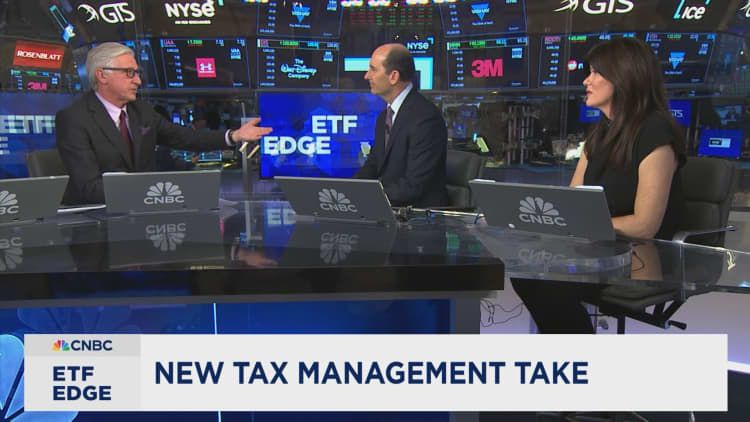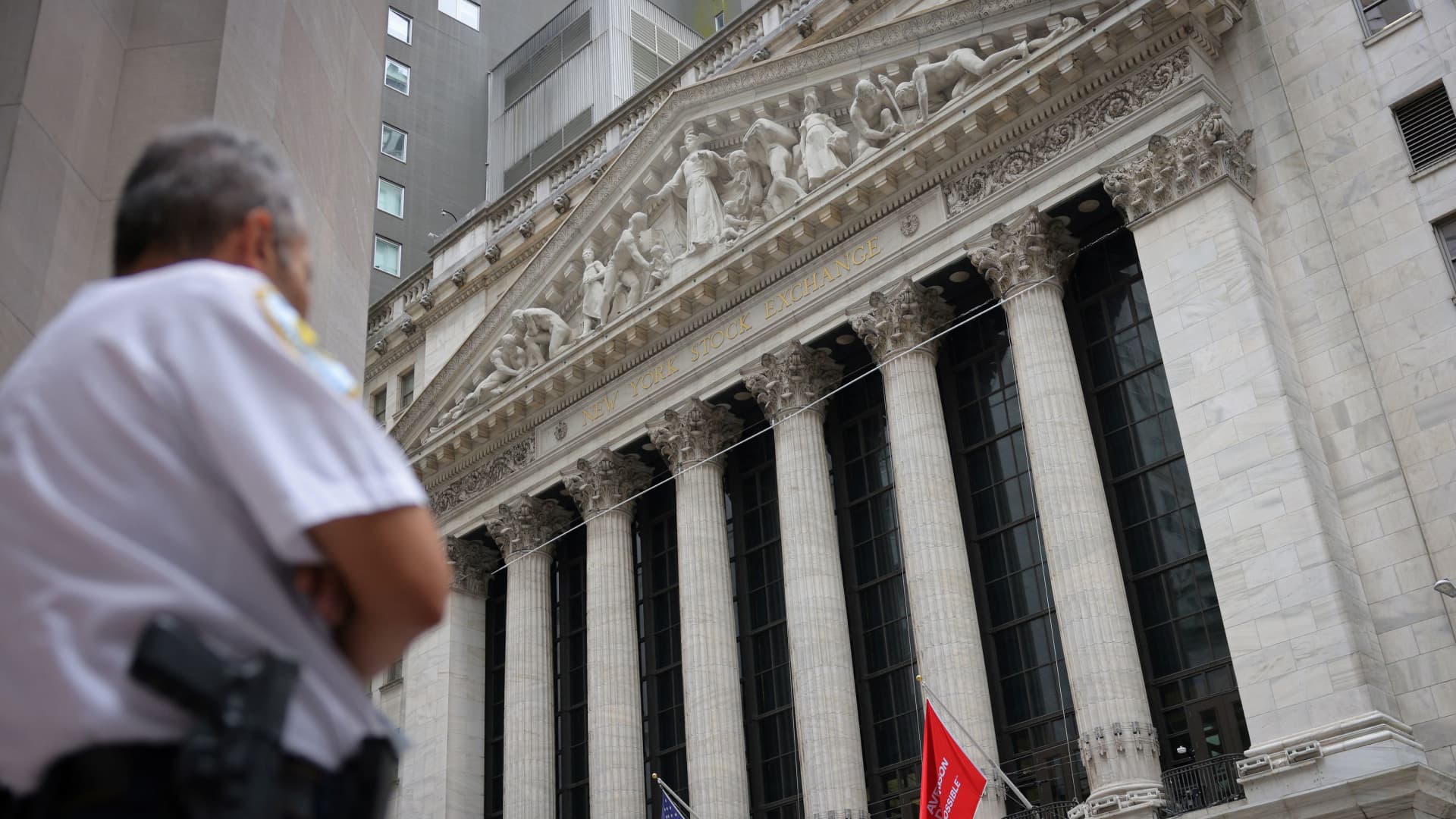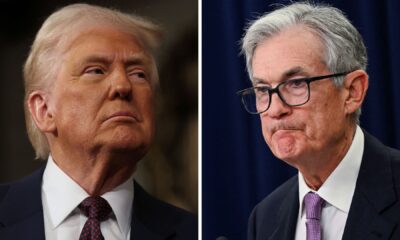Finance
New ETF looks to profit from municipal bonds
Published
1 year agoon


A new ETF is trying to capture profits in the municipal funds space.
BondBloxx’s Joanna Gallegos is behind the IR+M Tax-Aware Short Duration ETF (TAXX) — which launched less than a month ago.
“When you think about municipal bond portfolios, you really want people to think beyond them and look for the relative value of after-tax income,” the firm’s co-founder and COO told CNBC’s “ETF Edge” on Monday.
Gallegos sees actively managed municipal bond exchange-traded funds as an income-generating opportunity in a high rate environment. She expects healthy returns even if the Federal Reserve starts to cut interest rates this year.
According to the BondBloxx website, almost 62% of TAXX’s holdings are in municipal bonds. Its five largest muni holdings by state as of Thursday were Illinois, Pennsylvania, New Jersey, New York and Alabama.
The ETF also includes exposure to corporate and securitized bonds. The firm states the fund’s mixed-bond approach presents a “wider opportunity” to increase after-tax total returns. FactSet describes the fund as “tax efficient” — balancing strong after-tax income opportunities with capital preserved through both municipal and taxable short-duration fixed income securities.
“Right now, the portfolio’s tax-equivalent yield is close to 6%. It’s about 5.88 as you look at it,” Gallegos said. “It’s just the year to be thinking about taxes.”
As of Friday, TAXX is down 0.2% since its March 14 launch date.
Don’t miss these stories from CNBC PRO:
You may like
Finance
These are 3 big things we’re watching in the stock market this week
Published
6 hours agoon
April 27, 2025
A security guard works outside the New York Stock Exchange (NYSE) before the Federal Reserve announcement in New York City, U.S., September 18, 2024.
Andrew Kelly | Reuters
The stock market bounce last week showed once again just how dependent Wall Street has become on the whims of the White House.

U.S. brands are rapidly losing their appeal in China as locals increasingly prefer competitive homegrown players, especially as economic growth slows, according to a TD Cowen survey released Thursday. While overall preference for Western brands dropped to 9%, down from 14% last year, certain American companies face higher risks than others, the report said, citing in-person interviews of 2,000 consumers with varied income levels in larger Chinese cities. TD Cowen partnered with an unnamed Beijing-based advisory firm to conduct the survey in February 2025, following a similar study in May 2024. The analysts see Apple ranking among the better-positioned brands in China. But they warned that several other American companies face high regional risks despite management optimism. China’s top leaders on Friday acknowledged the growing effect of trade tensions, and pledged targeted measures for struggling businesses. The official readout stopped short of a full-on stimulus announcement. “This year’s survey was conducted before the US-China trade war intensified, though threats were on the horizon,” the TD Cowen analysts said. “Add this factor to the equation, and it’s easy to see why uncertainty will remain elevated and households are likely to remain cautious going forward.” The survey found income expectations declined, with the share of respondents expecting a decline in pay over the next 12 months rising to 10% from 6%. In particular, Chinese consumers plan to spend less on a beauty items over the next six months, the survey showed, while increasing their preference for Chinese brands. U.S. cosmetics giant Estée Lauder retained first place in terms of highest awareness among Western beauty brands in China, but preference among consumers dropped to 19.6% of respondents, down from 24.3% last year. That contrasted with increases in respondents expressing a preference for the second and third market players Lancome and Chanel, respectively. In the quarter that ended Dec. 31, Estée Lauder said its Asia Pacific net sales fell 11%, due partly to “subdued consumer sentiment in mainland China, Korea and Hong Kong.” Asia Pacific accounted for 32% of overall sales in the quarter. In the lucrative sportswear category, Nike “lost meaningful preference in every category” versus last year, while local competitors Li-Ning and Anta saw gains, the survey found. TD Cowen’s analysis showed that among U.S. sportswear brands facing the most earnings risk relative to consensus expectations, Nike has the highest China sales exposure at 15%. “The China market is one characterized as a growth opportunity for sport according to Nike management in its recent fiscal Q3:25 earnings call in March 2025,” the analysts said, “but that the macro offers an increasingly challenging operating environment.” It’s not necessarily about slower growth or nationalism. While the survey found a 4-percentage-point drop in preference for foreign apparel and footwear brands, it also showed a 3-percentage-point increase in the inclination to buy the “best” product regardless of origin. “The implied perception here is that Western brands are offering less in the way of best product or value,” the TD Cowen analysts said. Starbucks similarly is running into fierce local competition while trying to maintain prices one-third or more above that of competitor Luckin Coffee, the report said. The survey found that the U.S. coffee giant “lags peers in terms of value and quality perception improvement.” Other coffee brands such as Manner, Tim’s, Cotti, %Arabica and M Stand have also expanded recently in China. Starbucks’ same-store sales in China fell 6% year on year in the quarter that ended Dec. 29, bringing the region’s share of total revenue to just under 8%. More worrisome is that a highly anticipated coffee boom in China may not materialize. “We note daily and weekly frequency of purchase among coffee drinkers are decreasing, suggesting the coffee habit seen in the U.S. is not taking hold in China,” the analysts said. They noted a new ownership structure for Starbucks‘ China business would be positive for the stock given the lack of near-term catalysts. TD Cowen rates Starbucks a buy, but has hold ratings on Nike and Estée Lauder.
Finance
Apple iPhone assembly in India won’t cushion China tariffs: Moffett
Published
1 day agoon
April 26, 2025

Leading analyst Craig Moffett suggests any plans to move U.S. iPhone assembly to India is unrealistic.
Moffett, ranked as a top analyst multiple times by Institutional Investor, sent a memo to clients on Friday after the Financial Times reported Apple was aiming to shift production toward India from China by the end of next year.
He’s questioning how a move could bring down costs tied to tariffs because the iPhone components would still be made in China.
“You have a tremendous menu of problems created by tariffs, and moving to India doesn’t solve all the problems. Now granted, it helps to some degree,” the MoffettNathanson partner and senior managing director told CNBC’s “Fast Money” on Friday. “I would question how that’s going to work.”
Moffett contends it’s not so easy to diversify to India — telling clients Apple’s supply chain would still be anchored in China and would likely face resistance.
“The bottom line is a global trade war is a two-front battle, impacting costs and sales. Moving assembly to India might (and we emphasize might) help with the former. The latter may ultimately be the bigger issue,” he wrote to clients.
Moffett cut his Apple price target on Monday to $141 from $184 a share. It implies a 33% drop from Friday’s close. The price target is also the Street low, according to FactSet.
“I don’t think of myself as the biggest Apple bear,” he said. “I think quite highly of Apple. My concern about Apple has been the valuation more than the company.”
Moffett has had a “sell” rating on Apple since Jan. 7. Since then, the company’s shares are down about 14%.
“None of this is because Apple is a bad company. They still have a great balance sheet [and] a great consumer franchise,” he said. “It’s just the reality of there are no good answers when you are a product company, and your products are going to be significantly tariffed, and you’re heading into a market that is likely to have at least some deceleration in consumer demand because of the macro economy.”
Moffett notes Apple also isn’t getting help from its carriers to cushion the blow of tariffs.
“You also have the demand destruction that’s created by potentially higher prices. Remember, you had AT&T, Verizon and T. Mobile all this week come out and say we’re not going to underwrite the additional cost of tariff [on] handsets,” he added. “The consumer is going to have to pay for that. So, you’re going to have some demand destruction that’s going to show up in even longer holding periods and slower upgrade rates — all of which probably trims estimates next year’s consensus.”
According to Moffett, the backlash against Apple in China over U.S. tariffs will also hurt iPhone sales.
“It’s a very real problem,” Moffett said. “Volumes are really going to the Huaweis and the Vivos and the local competitors in China rather than to Apple.”
Apple stock is coming off a winning week — up more than 6%. It comes ahead of the iPhone maker’s quarterly earnings report due next Thursday after the market close.
To get more personalized investment strategies, join us for our next “Fast Money” Live event on Thursday, June 5, at the Nasdaq in Times Square.

Water sommeliers say the simplest drink is the future of luxury

These are 3 big things we’re watching in the stock market this week

As Real ID deadline approaches, there are ‘workarounds,’ experts say

New 2023 K-1 instructions stir the CAMT pot for partnerships and corporations

The Essential Practice of Bank and Credit Card Statement Reconciliation

Are American progressives making themselves sad?
Trending
-

 Economics1 week ago
Economics1 week ago‘He should bring them down’
-

 Economics1 week ago
Economics1 week agoTrump’s approval rating on economy at lowest of presidential career
-

 Blog Post1 week ago
Blog Post1 week agoDocumenting Bookkeeping Processes and Procedures
-

 Economics1 week ago
Economics1 week agoDonald Trump wants a certain kind of immigrant: the uber-rich
-

 Economics1 week ago
Economics1 week agoChecks and Balance newsletter: The Democrats’ future is up for grabs
-

 Economics1 week ago
Economics1 week agoTrump tariffs could cause summer economic slump: Chicago Fed president
-

 Personal Finance5 days ago
Personal Finance5 days agoConsumers are making different financial choices in response to tariffs
-

 Personal Finance1 week ago
Personal Finance1 week agoExperts see higher stagflation risks. Here’s what it means for your money
